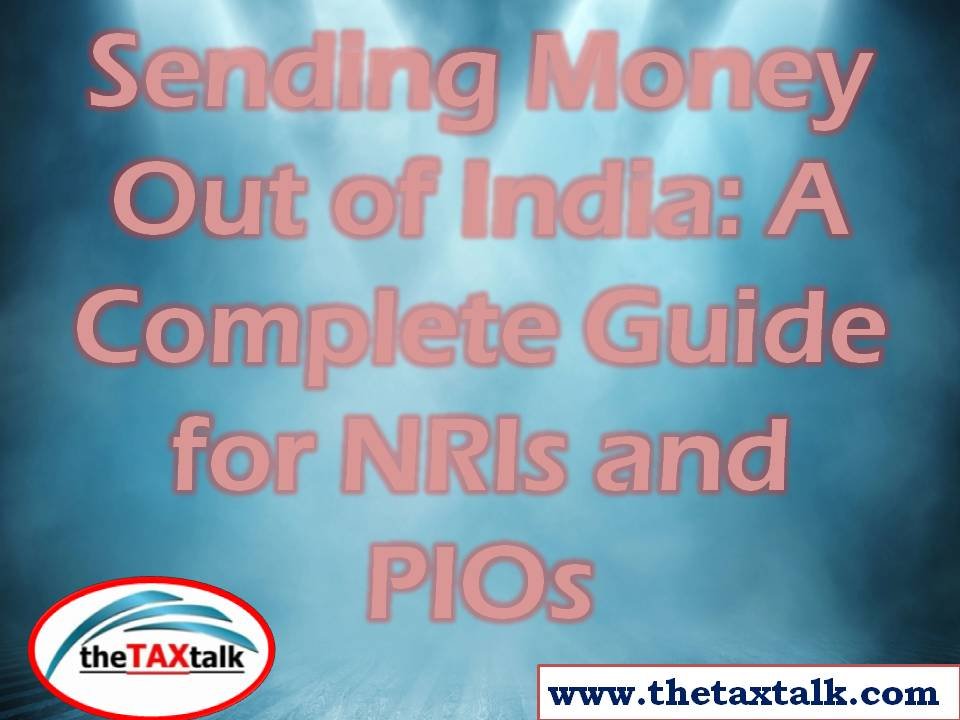![]()
Sending Money Out of India: A Complete Guide for NRIs and PIOs
Are you an NRI or a Person of Indian Origin (PIO) looking to send money out of India? Whether you’re repatriating property sale proceeds, inherited wealth, or investment gains, India’s Foreign Exchange Management Act (FEMA) governs every move. Here’s a clear, updated, and SEO-optimised guide to help you navigate the remittance maze without risking compliance errors or tax pitfalls.
What is Remittance of Assets under FEMA?
“Remittance of assets” refers to transferring money from India to a foreign country by NRIs and PIOs. This includes:
- Bank deposits and investments
- Proceeds from sale of immovable property
- Inherited or gifted assets
- Shares, insurance, pension, and provident fund balances
USD 1 Million Remittance Scheme – Know Your Limit!
Under FEMA, NRIs and PIOs are allowed to remit up to USD 1 million per financial year (April–March) from their NRO accounts. This limit covers:
- Income from Indian sources (e.g., rent, interest)
- Property sale proceeds
- Inherited or gifted assets
Key points to remember:
- The limit is per person, not per account.
- If you remit in instalments, use the same authorised dealer bank.
- Funds must be legally acquired and fully tax-paid.
- False declarations can lead to penalties under FEMA and the Income Tax Act.
Repatriating Sale Proceeds of Immovable Property
Selling a property in India and sending money abroad? Here’s what you need to know:
1. If you bought property while resident in India or inherited it, you must use the USD 1 million scheme or seek RBI permission for larger amounts.
2. If you purchased property with foreign funds, repatriation is allowed without limit—but only for up to two residential properties in your lifetime.
3. Housing loan repayments made from NRE/FCNR accounts or inward remittances are considered foreign-sourced and qualify under this special facility.
What About Rent, Dividends, and Pensions?
These are treated as current account transactions and are freely repatriable with no monetary limit. You may remit:
- Rental income
- Interest from deposits
- Dividends
- Pension payments
Just ensure taxes are deducted or provided for, and furnish Form 15CA or Form 15CB where applicable.
Form 15CA and 15CB – The Taxman is Watching!
Under Section 195 of the Income Tax Act and Rule 37BB:
- Form 15CA: A declaration of remittance by the sender
- Form 15CB: A Chartered Accountant certificate (needed for most taxable remittances above ₹5 lakh)
Breakdown of Form 15CA filing:
| Remittance Type | Form Required |
|---|---|
| Up to ₹5 lakh & non-taxable | 15CA – Part A |
| Taxable but with certificate under Sec 197 | 15CA – Part B |
| Taxable and > ₹5 lakh | 15CA – Part C + 15CB |
| Non-taxable | 15CA – Part D |
Penalty for non-filing or misreporting? ₹1,00,000 under Section 271-I.
Power of Attorney (POA) Rules
An NRI can authorise a resident (POA holder) to operate their account. But note:
- POA can remit current income only (e.g., rent, interest)
- Capital remittances (like property sale proceeds) require explicit NRI authorisation and documentation
Students Going Abroad? You’re an NRI Too!
As per RBI Circular No. 45 (dated Dec 8, 2003), students who leave India for studies are treated as NRIs from the date of departure, not based on duration. They can:
- Open NRE/NRO/FCNR accounts
- Invest in property, shares, and mutual funds
- Use the USD 1 million scheme
- Freely repatriate investment income
When Do You Need RBI Approval?
Automatic remittance is allowed in most cases, but RBI approval is mandatory when:
- Remittance exceeds USD 1 million per year
- Property was acquired under Section 6(5) (before becoming NRI or inherited)
- Transactions fall outside authorised bank powers (e.g., disputed assets)
- You’re a citizen of restricted countries (e.g., Pakistan, China, Iran)
Common Challenges NRIs Face
Despite clear rules, practical hurdles remain:
- Confusion about taxability and which Form 15CA part to use
- Documentation delays, especially when coordinating across countries
- Technical errors on the Income Tax e-filing portal
- Mismatches between Form 15CA & 15CB
- Extra formalities for joint NRO accounts or co-owned assets
Pro tip: Don’t treat this as a one-time exercise. Even monthly rent remittances need compliance!
Conclusion: Plan Ahead, Stay Compliant
Sending money out of India as an NRI or PIO is not as daunting if you follow the rules. A smooth remittance process requires:
- Clear tax documentation
- Use of correct Forms (15CA/15CB)
- Close coordination with a Chartered Accountant
- Choosing the right bank and authorised dealer
- Awareness of your eligibility and remittance limits
Whether you’re selling a house, transferring rent, or sending money to your overseas account—do it right, do it legally, and do it smartly.

